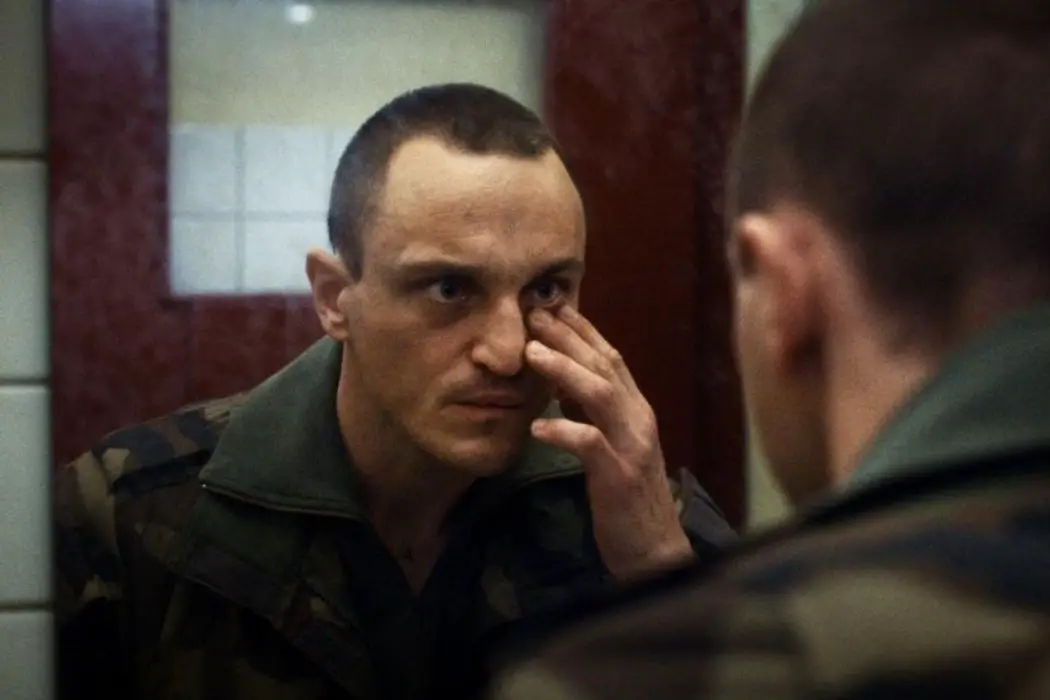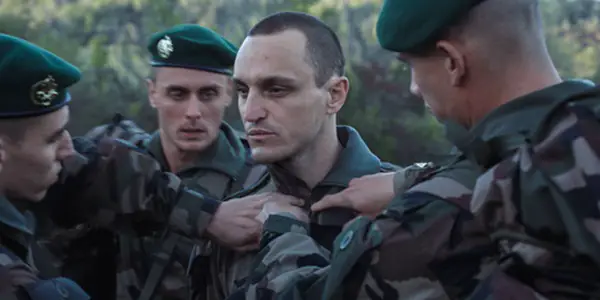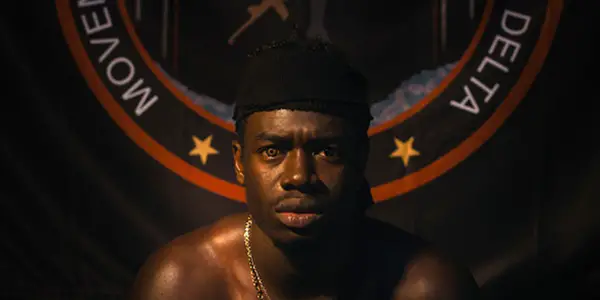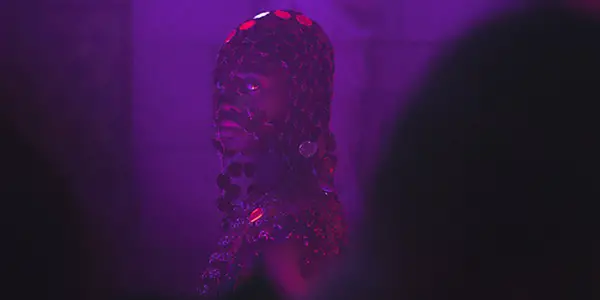DISCO BOY: Not-So-Beau Travail

Lee Jutton has directed short films starring a killer toaster,…
The feature film debut of Italian writer-director Giacomo Abbruzzese, Disco Boy tells the intertwined stories of two fighters; one is seeking a new way of life in a new home, while the other is attempting to save the life and home he has always known. Yet both also share a common desire: to defy the destinies seemingly predetermined by the conditions of their births and live better, freer lives. Starring Franz Rogowski (Passages, Transit) in a role that perfectly suits his haunted, haggard, yet still strangely beautiful visage—not to mention his considerable talents as a dancer—Disco Boy looks and sounds gorgeous. This is very fortunate, as the film’s narrative is otherwise too weak and cribs too much from the Claire Denis classic Beau Travail to truly hold one’s attention.
Life and Death
Undocumented Belarusian emigrants Aleksei (Rogowski) and Mikhail (Michał Balicki) are in search of new opportunities in France. But when tragedy strikes in the middle of their intense eight-day journey across Europe, Aleksei finds himself arriving in Paris alone. His only real option is to enlist in the French Foreign Legion; after five years of service, even undocumented foreigners are granted French passports with no further questions asked.

Meanwhile, in the Niger Delta, Jomo (newcomer Morr Ndiaye, who in real life embarked on an arduous journey of his own from his homeland of Gambia to Sicily) is a member of a guerilla group fighting the predatory oil companies whose business threatens the future of his village. Jomo and his sister, Udoka (Laëtitia Ky, an Ivorian activist and model previously seen in Philippe Lacôte’s fantastic Night of the Kings) are talented dancers who move so totally in unison that watching them feels as though one is witnessing something otherworldly. When Jomo and one of his fellow warriors muse on how different their lives would have been if they had been born “on the white side,” Jomo says he would have been a nightclub dancer—a disco boy.
A fateful encounter between Aleksei’s regiment and Jomo’s revolutionaries leaves Aleksei wrestling with the aftereffects of PTSD. He seeks solace on the dance floor, particularly in the magnificent moves of a mysterious woman he sees performing in the club one evening. Of course, we know who this woman is, and why Aleksei is drawn to her by an almost supernatural force that has taken hold of his body and mind.
Dance the Night
From a purely aesthetic perspective, Disco Boy is magnificent. Shot by the legendary French cinematographer Hélène Louvart (The Lost Daughter, La Chimera), the film alternates between nightmarish visions of warfare—including a pivotal sequence shot entirely in infrared—and dreamlike moments of escape during the neon-lit Parisian nights. The electric thrum of the musical score by French producer and composer Vitalic perfectly compliments the film’s visuals and further emphasizes the hallucinatory nature of Aleksei’s journey, while acclaimed Nigerian choreographer Qudus Onikeku deserves great praise for creating the film’s mesmerizing dance sequences. Indeed, Disco Boy almost feels like a feature-length music video, not least because the film’s narrative doesn’t quite measure up to the otherwise meticulous craft on display.

Disco Boy dips into important topics like postcolonialism and PTSD but doesn’t really say anything of substance about them apart from “these things exist and they’re not great.” Showing both sides of a war is an admirable intention, especially when highlighting how the young people who end up sacrificed in such scenarios often have much more in common with each other than they do with the powers that have sent them out to die. However, Aleksei is given so much more screen time than Jomo and Udoka that one is left with the uncomfortable feeling that the African characters exist primarily to aid in the European character’s development. This is a real shame for multiple reasons, including but not limited to the fact that Ndiaye and Ky are both charismatic talents.
Yet while this might be Abbruzzese’s first feature, he’s already learned one important filmmaking lesson: if your script’s message is a bit too muddled, you can do far worse than just focusing your camera on Franz Rogowski’s face to get your point across. One of our most intriguing and enigmatic screen personalities, Rogowski is at his best when he has the least to say; his greatest tools as an actor are the raw materials of his face and body, which he uses to convey emotion far more powerfully than any amount of dialogue ever could. Disco Boy plays to those strengths, focusing on the various trials that Aleksei’s body goes through throughout the film: from his death-defying escape from Belarus to his intense French Foreign Legion training, from his efforts to survive his mission in the Niger Delta to his climactic encounter with Udoka on the dance floor.

Still, that dance scene—as thrilling as it is to watch unfold—is also just one of many ways in which Disco Boy too loudly echoes Beau Travail, another drama centered on a man’s traumatic experiences in the French Foreign Legion. That film ends with an iconic, acrobatic dance from star Denis Levant that is arguably one of the greatest dance scenes in cinema history. Wearing your influences on your sleeve is one thing; wearing them so ostentatiously that one cannot help but compare your film negatively to said influences is another thing altogether.
Conclusion
Disco Boy doesn’t quite work, though thanks to some quality craftsmanship and the always-fantastic Franz Rogowski, it does come close.
Disco Boy opens at Quad Cinema in New York on February 2 and at Laemmle Theaters in Los Angeles on February 9, 2024.
Does content like this matter to you?
Become a Member and support film journalism. Unlock access to all of Film Inquiry`s great articles. Join a community of like-minded readers who are passionate about cinema - get access to our private members Network, give back to independent filmmakers, and more.
Lee Jutton has directed short films starring a killer toaster, a killer Christmas tree, and a not-killer leopard. Her writing has appeared in publications such as Film School Rejects, Bitch: A Feminist Response to Pop Culture, Bitch Flicks, TV Fanatic, and Just Press Play. When not watching, making, or writing about films, she can usually be found on Twitter obsessing over soccer, BTS, and her cat.













